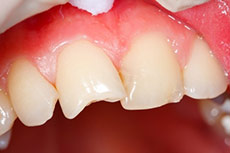5 Reasons Why Your Bottom Teeth May Hurt
September 24th, 2015
 Constant tooth pain is irritating, and can be downright debilitating if it hurts enough. If you experience regular bottom teeth pain, the first thing you should do is visit your dentist so that whatever is wrong doesn’t get worse. But it doesn’t hurt to learn what might be causing your bottom teeth to hurt in the meantime. Here are 5 reasons why your bottom teeth may hurt.
Constant tooth pain is irritating, and can be downright debilitating if it hurts enough. If you experience regular bottom teeth pain, the first thing you should do is visit your dentist so that whatever is wrong doesn’t get worse. But it doesn’t hurt to learn what might be causing your bottom teeth to hurt in the meantime. Here are 5 reasons why your bottom teeth may hurt.
You’ve Got A Cavity
Cavity Tooth Pain Symptoms: Typically, pain caused by cavities can be felt sharply, consistently and suddenly in one or more teeth when you bite down. Cavities can also cause sensitivity.
If you haven’t been getting rid of all of the plaque on and around your bottom teeth by brushing, flossing and using mouthwash, you may have cavity. Cavities can also be caused by gum recession. Cavities are holes in your teeth created by acids, which love eating away at your enamel. Thankfully, fixing a cavity is quick and easy. All your dentist has to do is fill it in with dental filling material.
Your Root Might Be Infected
Infected Root Tooth Pain Symptoms: If you experience a severe and constant bottom toothache that causes throbbing or shooting pain, you may have an abscessed tooth, or root infection. Your teeth may also feel sensitive to extreme temperatures and when biting down, and your gums and glands may be swollen.
Severe tooth decay is usually the reason why an infection develops at the root of your tooth. When acids have been allowed to dissolve your enamel for a while, bacteria infects the center of your tooth (the pulp) between your gum and your tooth. If you don’t see a dentist to cure your infection, it can spread to the bones that support your bottom teeth. A root canal can be performed to rid your teeth of the infection.
You’re Clenching and/or Grinding Your Teeth
Clenching/Grinding Tooth Pain Symptoms: If you bottom teeth pain is less severe, and more of a constant throbbing or achy pain, you may grind or clench your teeth too much.
Many people clench their teeth when they are concentrating or working out at the gym. You may also grind your teeth while you’re sound asleep. When you grind or clench your teeth often, you wear down your enamel, which exposes the tubes that lead to your nerves. This can lead to sensitivity and tooth pain. If you think you clench or grind your teeth, speak to your dentist about wearing a mouth guard.
You Fractured Your Tooth
Fractured Tooth Pain Symptoms: If you experience irregular pain in a bottom tooth when you’re chewing or when your tooth is exposed to extreme temperatures, you may have a fractured tooth.
The center of your tooth contains soft tissue, called the pulp, where your nerves are located. Your enamel and dentin, which is the hard layer underneath your enamel, protect your nerves. The closer your pulp is to being exposed, the more you irritate your nerves, which can cause pain and sensitivity. There are several different dental procedures that treat cracked teeth, depending on the severity, from crowns to root canals.
You Have Other Serious Health Issues
Bottom teeth pain isn’t always a sign that you have dental issues. Teeth pain can also be caused by a variety of other serious health issues that you might not even think of. These include heart attacks, sinus infections, cluster headaches, viral infections, diabetes, nerve-related disease, alcohol or drug abuse, and more.
The only way to truly find out what is causing your bottom teeth to hurt is to speak to your dentist. They’ll be able to get to the root of your teeth pain and provide you with solutions to make you pain-free again.

 Repairing a chipped tooth is usually not as hard as one would imagine. Through several different processes, depending on the severity of the chipped tooth, a dentist can make your smile look good as new.
Repairing a chipped tooth is usually not as hard as one would imagine. Through several different processes, depending on the severity of the chipped tooth, a dentist can make your smile look good as new. Whether you took a bite into something too hard for your tooth, or took a nasty spill, the potential to crack, fracture or chip your tooth is possible. Thankfully, there are several ways to fix a chipped tooth depending on the severity of the accident.
Whether you took a bite into something too hard for your tooth, or took a nasty spill, the potential to crack, fracture or chip your tooth is possible. Thankfully, there are several ways to fix a chipped tooth depending on the severity of the accident.




 Website Powered by Sesame 24-7™
Website Powered by Sesame 24-7™